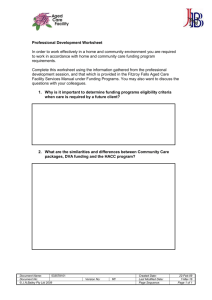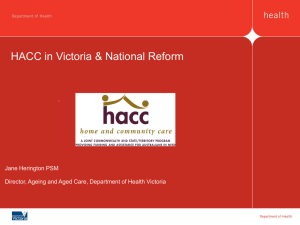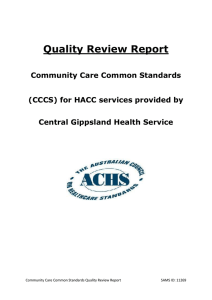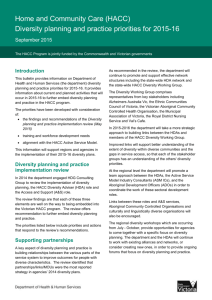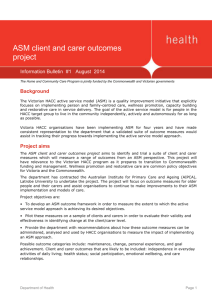Legislative requirements
advertisement
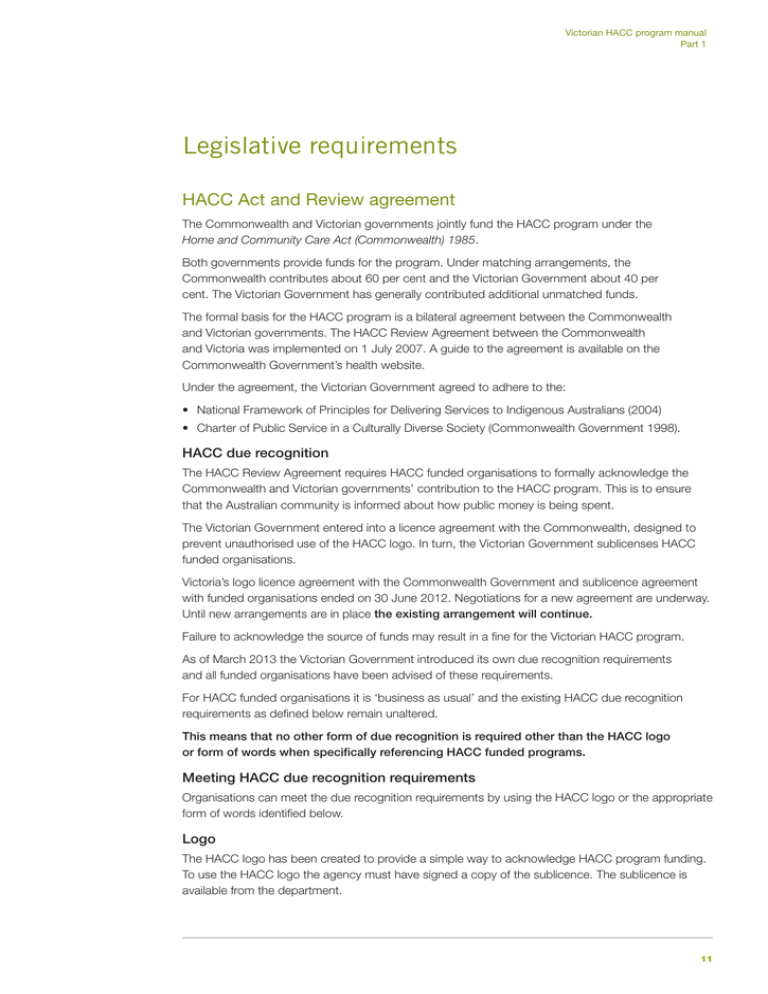
Victorian HACC program manual Part 1 Legislative requirements HACC Act and Review agreement The Commonwealth and Victorian governments jointly fund the HACC program under the Home and Community Care Act (Commonwealth) 1985. Both governments provide funds for the program. Under matching arrangements, the Commonwealth contributes about 60 per cent and the Victorian Government about 40 per cent. The Victorian Government has generally contributed additional unmatched funds. The formal basis for the HACC program is a bilateral agreement between the Commonwealth and Victorian governments. The HACC Review Agreement between the Commonwealth and Victoria was implemented on 1 July 2007. A guide to the agreement is available on the Commonwealth Government’s health website. Under the agreement, the Victorian Government agreed to adhere to the: • National Framework of Principles for Delivering Services to Indigenous Australians (2004) • Charter of Public Service in a Culturally Diverse Society (Commonwealth Government 1998). HACC due recognition The HACC Review Agreement requires HACC funded organisations to formally acknowledge the Commonwealth and Victorian governments’ contribution to the HACC program. This is to ensure that the Australian community is informed about how public money is being spent. The Victorian Government entered into a licence agreement with the Commonwealth, designed to prevent unauthorised use of the HACC logo. In turn, the Victorian Government sublicenses HACC funded organisations. Victoria’s logo licence agreement with the Commonwealth Government and sublicence agreement with funded organisations ended on 30 June 2012. Negotiations for a new agreement are underway. Until new arrangements are in place the existing arrangement will continue. Failure to acknowledge the source of funds may result in a fine for the Victorian HACC program. As of March 2013 the Victorian Government introduced its own due recognition requirements and all funded organisations have been advised of these requirements. For HACC funded organisations it is ‘business as usual’ and the existing HACC due recognition requirements as defined below remain unaltered. This means that no other form of due recognition is required other than the HACC logo or form of words when specifically referencing HACC funded programs. Meeting HACC due recognition requirements Organisations can meet the due recognition requirements by using the HACC logo or the appropriate form of words identified below. Logo The HACC logo has been created to provide a simple way to acknowledge HACC program funding. To use the HACC logo the agency must have signed a copy of the sublicence. The sublicence is available from the department. 11 Victorian HACC program manual Part 1 Form of words If your organisation decides not to sign the deed of sublicence, the due recognition requirement for the HACC program can be met by using a simple phrase. The following examples illustrate some alternative phrases that are considered appropriate. This activity/project/service/organisation: • was jointly funded by the Commonwealth and Victorian governments • is supported by financial assistance from the Commonwealth and Victorian governments. In using the HACC logo the following guidelines must be adhered to: • the logo cannot be altered in any way, except for size • the text underneath the logo can be made larger and more legible but cannot be removed • the logo may be used in mono (black) or coloured (authorised PMS colours are burgundy PMS690CVC and gold PMS126CVC, the logo cannot be reproduced in any other colours). Exclusions Clause 4(2) of the HACC Review Agreement details a number of services that are outside the scope of the HACC program, because funding is provided through other government programs. These exclusions do not relate to a person’s eligibility to receive services. See Part 2 for information on eligibility. The HACC program cannot fund the services listed below: • the provision of accommodation (including rehousing and supported accommodation) or a related support service • the provision of a health aid or appliance, except where these items are not normally available through other government funded programs, are required for the operation of an approved project, and remain the property of the service provider • the provision of treatment services for acute illness (including a convalescent or post-acute care service), except in circumstances where a service provides overall maintenance and support to people assessed as being within the target population, who are recovering from a previous period of acute care treatment • rehabilitative services directed solely towards increasing a person’s level of independent functioning • services provided for people with a specific disability other than those with dementia or a related condition • services provided primarily for parents and children assessed as being within the category of families in crisis • specialist palliative care services. 12 Victorian HACC program manual Part 1 Role of Victorian Department of Health The Victorian Department of Health is responsible for managing HACC in Victoria in accordance with the national policy and objectives and is the primary point of contact for agencies and service users. The department has eight regional offices and a central office in Melbourne. The department conducts most of its business with service providers and service users via its regional offices. Each regional office has a service planning and performance management responsibility for the particular region. Each regional office also has a contact for information and advice regarding HACC. Regional offices are responsible for: • working with central office on policy and program development and understanding the impact of policies and priorities on the regional service system • working in partnership with providers and service users to identify regional priorities • negotiating service agreements to ensure the regional service system is equitable and accessible • working with HACC funded organisations on a range of quality assurance and improvement initiatives such as equitable access for special needs groups including strategies to support those who experience barriers to access as a result of their diversity • managing complaints in relation to the HACC program. Role of HACC funded organisations HACC funded organisations are responsible for managing and operating their services so as to comply with HACC policies, quality standards, guidelines and other requirements. This includes: • providing services in accordance with the Community Care Common Standards guide, statement of rights and responsibilities and Victorian HACC Program Complaints Policy • delivering services according to the relevant HACC policies, guidelines and other requirements included in the manual • delivering the agreed outputs and meeting performance requirements and conditions as specified in the Victorian Department of Health service agreement including minimum data set (MDS) reporting and financial requirements • implementing policy and practice in relation to service coordination, active service model approaches and diversity planning and practices • recruiting, supporting and supervising staff, and identifying and meeting the training needs of staff and volunteers • meeting duty of care requirements. When requested by the Commonwealth Department of Social Services or the Victorian Department of Health, HACC funded organisations must allow free and reasonable access to, and provide assistance with the inspection of HACC-related administrative records, accounts, land, equipment, transport items and buildings. This access may be used to ensure that funded organisations are complying with the conditions specified in this manual and the service agreement with the Victorian Department of Health. 13 Victorian HACC program manual Part 1 Other legislation Other legislation relevant to the planning and delivery of HACC services is noted in each section of this manual. Links HACC Review Agreement (2007) http://www.health.gov.au/internet/main/publishing.nsf/Content/hacc-review.htm Service agreement information kit for funded organisations (2011) http://www.dhs.vic.gov.au/facs/bdb/fmu/service-agreement/ National framework of principles for government service delivery delivering services to Indigenous Australians (2004) http://www.atns.net.au/agreement.asp?EntityID=2559 Information about the HACC logo sublicence can be obtained by emailing hacc@health.vic.gov.au For information and facts about the use of HACC services, see http://www.health.vic.gov.au/hacc/hacc_victoria/facts.htm. 14
